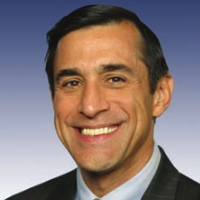Rep. Issa Says America’s Poor Are “Envy of the World”; Must Be Proud of California’s
 Representative Darrell Issa
Representative Darrell Issa
California Republican Congressman Darrell Issa, the wealthiest member of the House, told CNN last week that America’s poor are “somewhat the envy of the world,” while answering a question about income inequality.
He recognized that income inequality can be a problem, but thought our nation was a “good example” of what a robust capitalist system can accomplish, unlike in, say, Third World India. “America is the richest country on Earth because we’ve been able to put capital together,” the somewhat tone-deaf lawmaker said in explaining how the trickle-down has enriched us all. Issa, who has a net worth of $357 million, said:
“If you go to India or you go to any number of other Third World countries, you have two problems: You have greater inequality of income and wealth. You also have less opportunity for people to rise from the have not to the have. The quality of public education, the availability of the access. So, I think American is a good example.”
The PEW Research Center disagrees. Comparing the U.S. to a Third World nation is easy pickings. How does the country fare against the big boys? Drew DeSilver at PEW wrote, “The U.S. has one of the most unequal income distributions in the developed world, according to data from the Organization for Economic Cooperation and Development—even after taxes and social-welfare policies are taken into account.”
The United States is barely above the world income inequality average based on its most common measure, the Gini coefficient, a dense formula employed by the World Bank
Issa could be forgiven a certain myopia about the state of the nation if he were misled by his home state of California’s sparkling income-inequality record. But that is not the case.
According to a report from the Economic Policy Institute (EPI), California had the fifth worst ratio of 1% income earners to the 99% as of 2012, the last year data was available. The top 1% averaged $1.6 million a year compared to $45,775 of the other 99%.
And it’s getting worse—thus the report’s title: “The Increasingly Unequal States of America: Income Inequality by State, 1917 to 2012.” Nationally, between 2009 and 2012, income of the 1% rose 36.8% and declined 0.4% for the 99%.
It was worse in California. Income of the 1% rose 49.6% and dropped 3% for the others.
California’s inequality is even more striking for the geographical proximity of the haves and have-nots. A report (pdf) from Measure of America, a project of the Social Science Research Council, used metrics other than income to assess the relative well-being of people.
Combining measures of “health, access to knowledge and living standards,” researchers compared the welfare of people by congressional district and found California to be the most unequal of all. The district with the highest Human Development Index (HD) in the nation, encompassing much of Silicon Valley, is 100 miles from the nation’s lowest-rated district, the Central Valley.
Congressman Issa’s 49th District had the 91st highest HD out of the nation’s 436.
–Ken Broder
To Learn More:
Congressman Darrell Issa Calls America's Poor “Envy of World” (by Debbi Baker, U-T San Diego)
Inequality Widens in California Since the Recession (San Diego CityBeat)
The Increasingly Unequal States of America (Economic Policy Institute)
California: The Nation's Most Unequal State (by Tami Luhby, CNN)
The California Chasm (by Manuel Pastor & Dan Braun, Capital & Main)
California Low-Wage Earners’ Reward for Higher Productivity—Less Money (by Ken Broder, AllGov California)
Geographies of Opportunity: Ranking Well-Being by Congressional District (Measure of America) (pdf)
- Top Stories
- Controversies
- Where is the Money Going?
- California and the Nation
- Appointments and Resignations
- Unusual News
- Latest News
- California Forbids U.S. Immigration Agents from Pretending to be Police
- California Lawmakers Urged to Strip “Self-Dealing” Tax Board of Its Duties
- Big Oil’s Grip on California
- Santa Cruz Police See Homeland Security Betrayal in Use of Gang Roundup as Cover for Immigration Raid
- Oil Companies Face Deadline to Stop Polluting California Groundwater





